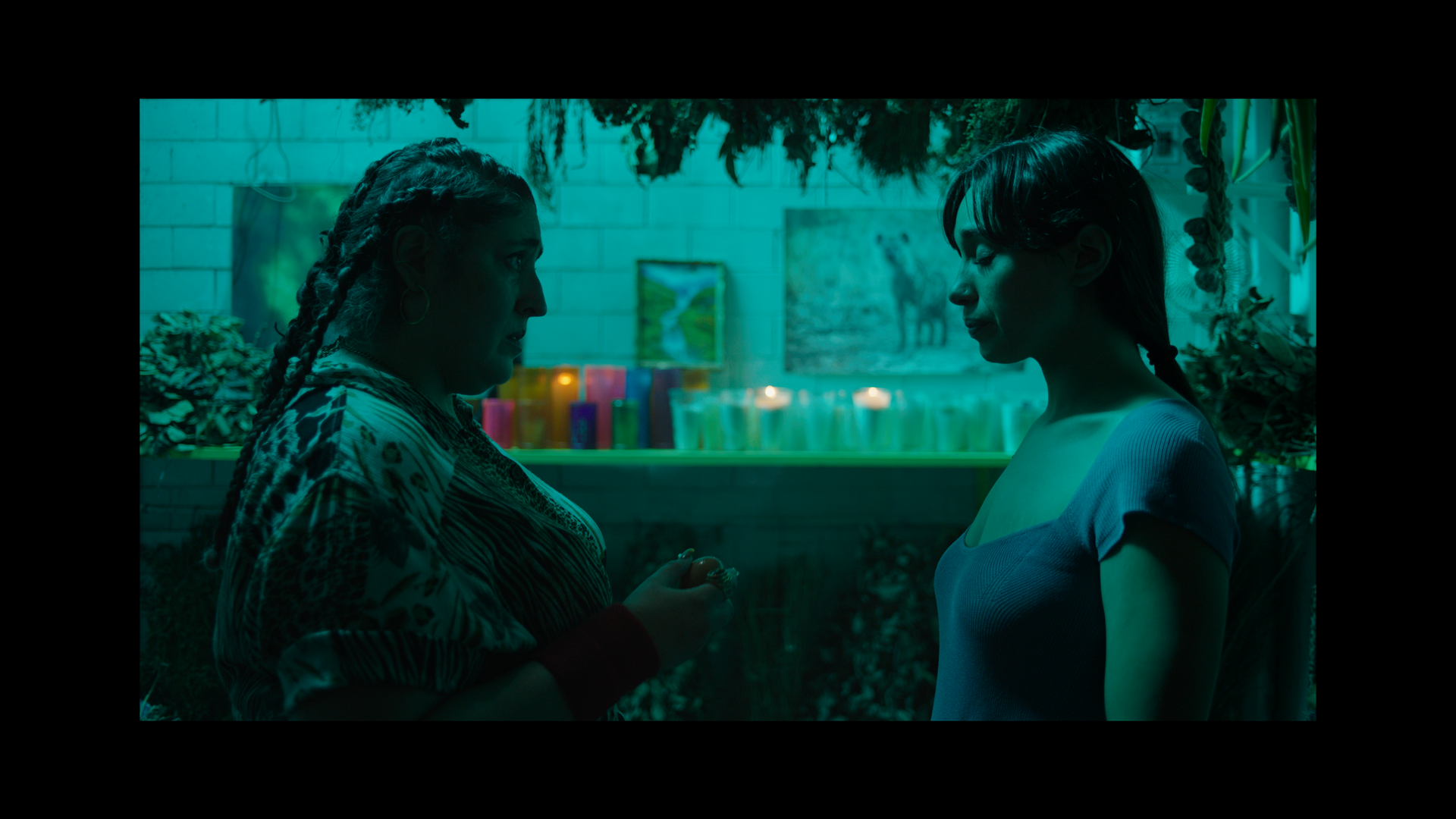

Too often, the ideal of womanhood and femineity is entangled with the concept of motherhood. To many, the ultimate end of being a woman is to bear children. Director Michelle Garza Cervera utterly rejects this concept in her debut full length Huesera: The Bone Woman, and in doing so presents an often times unnerving vision of innocence lost inch by inch and day by day, of a deeply melancholic yet wholly relatable urge to abandon a forward progress into adulthood and retreat into the freedom of childhood.

Now, a disclaimer of sorts: this film was not made for someone like me, a person who will never be able to experience giving birth. It is very clearly a film about the anxiety surrounding impending motherhood, and I believe Cervera’s intent was for the film to be about that. That being said, the story here is still so relatable that you can substitute any number of things in place of giving birth, and it still works. It alienates no one and speaks to everyone.

Huesera is the story of Valeria, a young Mexican artist. At the onset of the story, Val and her partner Raul have finally succeeded in becoming pregnant. The joy of impending parenthood is quickly overcome by a malignant presence in their lives, and Val’s thrill at the prospect of becoming a mother soon curdles into a sort of waking nightmare as she struggles not just to figure out if she wants to be a mother but whether she’s losing her mind in the process.

Cervera brings to a life a story that when stripped to its core is something almost universal: the final relinquishing of one’s childhood, the subsequent entrance into adulthood, and ultimately the surrendering to the forces of tradition and society. As I said before, maternity is certainly at the core of Cervera’s vision, but there any number of life events that could substitute for motherhood: graduating high school or college, marriage, becoming sexually active, joining the military, moving out of your parent’s house. There is something deeply relatable in the story of Natalia Solian’s Val, even before we’re treated to flashbacks of her teen years as a punk in Mexico City. In the opening scenes, there is a joy she shares with her partner at the prospect of becoming a parent. But when it is just Val having experiences related to parenthood (seeing children on a playground, having a little girl make faces at her while waiting at a maternity clinic) Solian masterfully imbues Val with a hesitancy we’ve all felt, and it soon becomes clear that this shared joy with Raul and his family is not nearly as genuine as they’d all like to believe. By the time we’re treated to a flashback of her youth (complete with a Project X hoodie) it is all but certain that nothing about Val’s life is what she wants it to be.

Val’s fear and anxiety about becoming a mother is complicated by the fact that something is stalking her and her new family: a crackly boned apparition that shadows her ever move. Soon, Val becomes that very phantom herself, her body contorting and her joints popping as she loses control of it. Her habit of cracking her knuckles throughout the film leads into this, almost getting the viewer used to the grisly sound of it before visually attaching something much more sinister to the gesture. The very image of an emaciated herky jerky silhouette contorting itself like a marionette is something of a troupe in the post-Exorcist “spider walk” world, but Cervera is using such imagery for far more than just cheap visual pop: in her hands, the image of a woman contorting and breaking and cracking is a very effective metaphor for the slow destruction of feminine free will at the hands of a world that insists motherhood is the be all end all of femininity. We are quite literally seeing the weight of societal expectation crush Val into something inhuman and monstrous. A testament to the power of the film is that despite doing so, Val is not presented as a bad person. Nor is she portrayed as directionless, or lazy, or any of the other prerogatives that could be hurled at a woman in her position. Rather, she is simply a woman doing what she wants instead of acceding control to an oppressive structure.

Huesera is, at its core, a story about a woman dealing with the horror and anguish of not just losing her youth and autonomy but also at the idea of losing her femininity simply because she rejects the desire to be a mother. It’s not that Val doesn’t care for her child; she obviously cares very deeply for them. Rather, it’s that she doesn’t want the life that comes with motherhood, or to satisfy the beliefs of traditional societies: women are meant to be mothers. It’s never made clear what Val really wants. And that’s fine. It’s okay to not figure things out when you’re young. But what’s not okay and is horrific is not just being forced into a life you don’t want but having that done to you in the name of patriarchal tradition. And there lies the true horror of Huesera: not in a spindly, crackly specter, but rather in the square peg being forced into a round hole against its will and the extinguishing of the spark of youth in the name of tradition.




